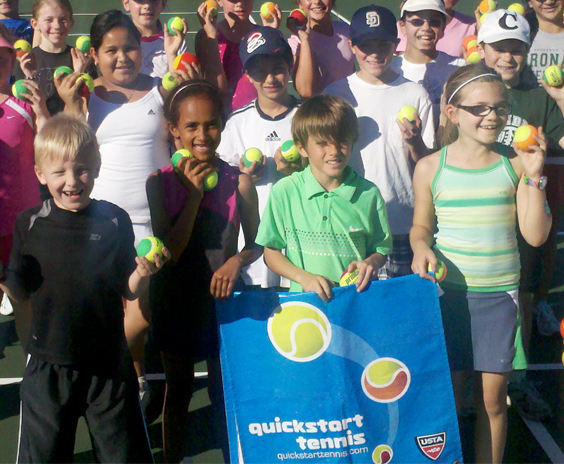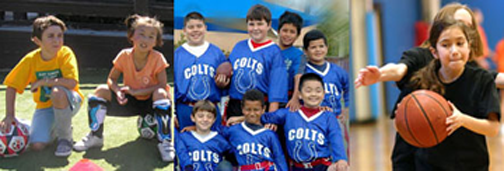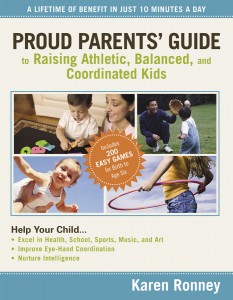|
Welcome to the PROUD PARENTS’ GUIDE blog
4 January 2010A Golden Moment Can Change Kids’ Lives
13 April 2011 As parents and coaches, we are given the gift of many days in our kids’ lives. If we’re lucky, those days add up to weeks, months, years and hopefully a lifetime. But have you ever boiled it down to a single moment? To refer to a past great ad campaign, a “Kodak Moment”? It’s a mental photographic image that lives forever…long after kids are grown.
As parents and coaches, we are given the gift of many days in our kids’ lives. If we’re lucky, those days add up to weeks, months, years and hopefully a lifetime. But have you ever boiled it down to a single moment? To refer to a past great ad campaign, a “Kodak Moment”? It’s a mental photographic image that lives forever…long after kids are grown.
I live for Golden Moments.
Yesterday, I had the misfortune to forget a Golden Moment in my child’s life. It wasn’t a conscious choice. It was human error. I’m a busy mom of three kids and a coach of hundreds. I also manage a family of five, each with conflicting life schedules. Sprinkle in three part-time jobs of coaching, teaching and writing…and it’s a crazy juggling act. Frankly, it’s a miracle more things don’t fall through the cracks.
My missed Golden Moment: My teenage daughter had her high school season-ending soccer banquet, where she was the JV team captain and won the Best Defender award. And I forgot. I wrote it down in my agenda, talked about it the night before…and proceeded to completely forget about it the day of the event.
She called me after the banquet started—crying and totally disappointed. I stopped what I was doing, raced home, and got her there 15 minutes before it ended. Her portion of the awards ceremony was over, along with her Golden Moment. I was heart-broken. It was a missed opportunity to be recognized for leadership skills and outstanding defensive play in front of her peers. Poof! It never happened.
I repeatedly apologized but I can’t turn back time and fix it. All I could do was hold her while she cried. The reality is there are just some life lessons that can’t be undone. Maybe she could have called me earlier, or maybe we should have talked about it that afternoon. It hurts, but we both have to move on.
However, today is a new day and a new thought…how can I learn from this and prevent it from happening again? Three ideas:
1- Slow down, do less. Some things are just not that important to fill up my days. It’s OK if the laundry sits in the dryer a little longer, the dishes don’t get immediately washed, and the house isn’t perfectly picked up. Make room for personal “Parent (mom/dad)” time ie…exercise, enjoy a hobby, or play with the kids.
2-Prioritize my “Daily To Do” lists. What do I really need to do today? Where do I want or need to go such as my daughter’s soccer banquet? What time? Learn that it’s OK to politely say, ”No” to family and friends if things don’t fit into my schedule.
3- Celebrate Golden Moments. Take time to recognize those precious Golden Moments with smiles, hugs, kisses, positive words, high fives, text messages, Facebook comments, emails or letters through snail mail.
So what is a Golden Moment? A Golden Moment could be when someone does a random act of kindness, aces a test, gets good grades, shows effort in school or sports, or displays great sportsmanship and leadership skills. It’s letting people know they did something extraordinary.
But the best Golden Moment? It’s the mental high five you give yourself–as a parent or a coach– for taking the time to make a difference.
Top Three Tips to Prepare Kids for Competition…and Life
30 October 2010As a tennis pro and a high school tennis coach, it always amazes me when kids have peak performances in sports. I wonder what kind of practice led up to it, and how did it happen so effortlessly. Recently my team won its third straight Eastern League Championship in the Southern California tennis community. We were 12-0 and it was a lot of work to focus on improvement rather than results. I believe success was a result of sticking to the basics of the sport. Now as we enter post-season CIF competition, my coaching goal is more of the same: “Continue to stick to the basics.”
This revelation arrived on the heels of a non-league loss in a practice match against a stronger school. My team had the tools to win but fell short of that result. Hindsight is a great teacher. What did I do wrong? What could my athletes have done differently? The answer? We put too much pressure on the results and forgot to do the basics. Consider it a lesson learned.
Here are some tips to prepare kids for peak performances:
1. Keep sports FUN at all costs: Whether you are playing catch with your kid in the backyard or your child is competing in a national junior tennis tournament, fun is the key factor. Laugh, smile and enjoy the process of hitting a tennis ball, catching a baseball or running a relay race. Include an element of friendly competition without negative consequences. Meaning… there should be no sad, frustrated or angry faces when it is over. Look for happy, proud and beaming smiles. Remember FUN is the reasons kids gravitate to sports, and it is the best reason to stay.
2. Involve all participants: The most boring part of youth and high school sports is standing around and watching someone else hit, catch or kick a ball. Every kid wants to play all the time. So if your child is doing more standing, watching and waiting rather than playing, it may be time for a change of team, coach or sport. If your child is active, involved and playing with his/her heart—then you are in the right place.
3. Encourage effort. In sports and life, the only thing you can control is yourself. Boil that concept down to the basic element in sports and you will find the word Effort. You can’t set a goal to win a game or match. All you can do is to try because there are so many factors out of an athlete’s control such as the skill of the opposing player or team, the weather, the environment and a child’s mind set. So the goal should be to give each performance your very best effort because that is all you can do. If you focus on the process of playing, you will be a winner no matter the score.
Next week my team is scheduled for post-season play and here’s what I’ll tell them.
“Have fun, play with your heart and a positive attitude, and try your best because that’s what champions do!!!!”
Fall Schedules For Kids Need Built In Days Off
21 August 2010
Now that summer is over and school is soon to start, it’s time to consider realistic and stress free schedules for the fall. Kids need time to learn, play, exercise and rest. Here is food for thought: Consider school time as an 8-hour job. After all, learning is work for kids. Add in about one or more hours of homework, and hopefully, an hour a day to exercise. It could be organized team sports or just playing outside at home. (Electronic and sedentary games are not considered exercise.) On average kids need one to two days off each week to just be kids, chill out walk the dog or play with their toys. So if your child plays recreational soccer, football, basketball or tennis or any other sport, keep it to no more than three days a week. Family Tip: plan for one week day off and one weekend day off. After all, even kids need a break!!
Top Three Tips To Avoid Child Obesity For Life
12 July 2010Better Food Choices and Simple Game Play Helps Kids Lead More Active, Healthy Lives
The top three warning signs that American children are in danger of becoming overweight or obese can be boiled down to three basic questions:
- Is my child engaged in sedentary after school activities such as watching television, texting, playing electronic games, and communicating with friends on a computer through social networks such as instant messaging, MySpace, and Facebook?
- Are my child’s preferred food and drink choices found in packaged boxes, snack bags and soda cans often advertised on television?
- Is my child getting less than 30 minutes of continuous aerobic exercise each day?
Well, if your answer is yes to one or more of these questions it might be time for a change because the first 18 years of a child’s life sets the stage for future health and fitness.
According to statistics from the Centers for Disease Control and Prevention (CDC) about 16 percent of all children and teens in the United States are overweight. They are at risk for a host of health issues including heart disease, high blood pressure, type 2 diabetes and some forms of cancer. Factor in the social and emotional stigma that unfit kids face at schools by bullying based on body size.
Other hidden factors that can lead to childhood obesity include exposure to commercial advertising for unhealthful food choices targeted at children’s television programming. According to an analysis by the Center for Science in the Public Interest (CSPI), “nearly 80 percent of food ads on the popular children’s network Nickelodeon are for foods of poor nutritional quality.” Combine that with the fact that a recent study has found that, if left unchecked, 43 percent of Americans will be obese by 2018, the dangers are clear. No matter how you look at it, childhood obesity is a problem that leads to bigger health issues in later life.
However, one expert believes the secret to preventing your child from becoming part of that alarming statistic is to offer healthy food choices, and start playing fun and easy 10 minute activities to promote fitness and coordination as early as birth. As your child grows, so should the various games and challenges to stimulate brain and body development.
“Kids who start ahead by being active, stay ahead to become the high academic and athletic performers in schools and in sports,” said Karen Ronney, author of Proud Parents Guide to Raising Athletic, Balanced, and Coordinated Kids from Thomas Nelson Publishing (www.karenronney.com). “Parents and caregivers can make all the difference by playing movement games with their children a few minutes each day. This promotes the idea that exercise is fun while forming a healthy habit of being active.”
Ronney suggests the prime time to start game play is during infancy, toddlerhood and the preschool years. Then increase physical challenges in the school age and teen years by adding more technical fundamental sports skills.
Here are the top 3 tips for giving your child the right start:
- Stimulate your baby’s eyes and hands to teach fine motor skills and visual tracking such as reaching for and grasping objects. Dangle a safe and colorful toy about 12 inches away from your child and guide his or her hand to hold it. Repeat and move the toy right, left, above the head, and in various directions.
- Promote brain cell growth and body balance in your toddler and preschooler through large motor movement while walking, hopping, skipping, rolling, running and two-footed jumping in simple at-home games. Design an easy backyard obstacle course that involves all of these actions. Make it a race to the finish.
- Develop core strength, eye-hand and eye-foot sports skills in your adventurous kindergartener and school age child such as kicking, catching and hitting large balls, bubbles and balloons. Advance to smaller standard balls, bats, rackets, hoops, jump ropes and flying discs. Play games that use both hands and feet for balanced development.
“Let your child be your guide on how quickly he or she becomes skilled in game play and body movement,” said Ronney, whose program lists over 200 activities using basic household supplies. “Always allow for success and gradually increase the challenge. The goal is to have fun and raise happy, balanced and coordinated kids who are physically, mentally and emotionally ready to excel in athletics, academics, music, art and other interests.”
They key, Ronney said, is starting early.


